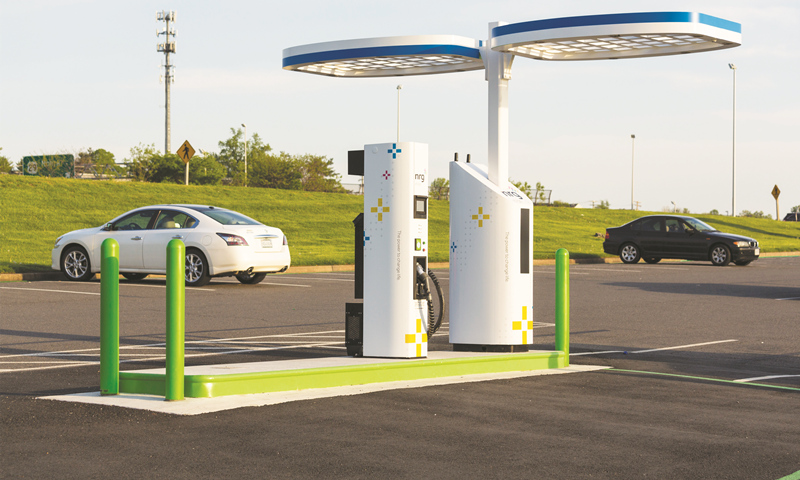EU to be self-sufficient in EV batteries by 2025
By Reuters - Global Times Source: Global Times - Reuters Published: 2020/11/26 18:48:40

A parking lot with charging piles Photo: VCG
The European Union could produce enough batteries by 2025 to power its fast-growing fleet of electric vehicles (EV) without relying on imported cells, European Commission Vice President Maros Sefcovic said on Tuesday.
As part of its plan to become climate neutral by 2050, the EU wants to boost local production as the building block for green industries - including hydrogen fuel to produce low-carbon steel and batteries to power clean vehicles.
"I am confident that by 2025, the EU will be able to produce enough battery cells to meet the needs of the European automotive industry, and even to build our export capacity," Sefcovic told the online European Conference on Batteries.
Today, China hosts roughly 80 percent of the world's lithium-ion cell production, however Europe's capacity is set to expand fast.
Europe has 15 large-scale battery cell factories under construction, including Swedish company Northvolt's plants in Sweden and Germany, Chinese battery maker CATL's German facility, and South Korean firm SK Innovation's second plant in Hungary.
Sefcovic said by 2025 planned European facilities would produce enough cells to power at least 6 million EVs.
While the coronavirus pandemic has seen overall car sales plummet, combined sales of battery and plug-in hybrid cars in Europe are expected to roughly double this year, to one million units, according to the NGO Transport & Environment.
With the Commission expecting 13 million low-emission vehicles on Europe's roads by 2025, further investments is needed.
"We need to make significant investments in creating a full European supply chain and labour market to support the battery factories," Northvolt's Vice President of Communications Jesper Wigardt said.
Sefcovic said the EU's 750 billion euro ($890 billion) coronavirus recovery fund was a "ready-made tool" to support projects.
Brussels will next month propose standards for the carbon footprint of batteries, while a private-public EU alliance aims to boost domestic supplies of the raw materials needed to make cells. That follows a similar EU scheme for battery projects launched in 2017.
While the EU is upgrading its vehicle industry, auto giants are eyeing the market, including US automaker Tesla.
Tesla is looking at expanding in Europe by entering the mass-market segment with a compact car, Chief Executive Elon Musk said on Tuesday.
"Possibly in Europe it would make sense to do, I guess, a compact car, perhaps a hatchback or something like that," Musk told an European online conference on batteries hosted by the German government.
"In the US, the cars tend to be bigger for personal taste reasons," he said. "In Europe, (they) tend to be smaller."
Musk said he had had some problems parking his five-meter long Tesla Model X car in German capital Berlin.
All its vehicles are several tens of centimeters longer than Volkswagen's Golf model, the European reference in compact sedans.
On a global level, Tesla is also due to market its new "Cybertruck" pickup within two years.
While companies eye EU market, European car makers are also targeting China.
Daimler AG and Geely Holding last Friday said China could emerge as a manufacturing and export hub for hybrid powertrains jointly developed for Volvo and Mercedes-Benz cars.
Earlier last week the German car maker said it will cooperate with China's Geely to build next-generation combustion engines for use in hybrid vehicles.
The engines will be produced in China as well as in Europe, and Geely and Daimler will cooperate in engineering, sourcing and production, the companies said in a joint press release.
"The export of the engine from China is considered to be an option," the release further said.
Mercedes-Benz aims for more than half of its passenger car sales to be comprised of plug-in hybrids or purely EVs by 2030.
An aggressive China-led shift to EVs is expected to slash global oil demand growth by 70 percent by 2030 and will help bring an end to the "oil era", according to research by the Carbon Tracker think tank published last Friday.
Within 10 years, China could save more than $80 billion in annual oil import costs as new-energy vehicles (NEVs) become increasingly competitive, Carbon Tracker said.
Its calculations were based on a "conservative" scenario by the International Energy Agency projecting that electric vehicles would account for 40 percent of China's total car sales by 2030, and for 20 percent of sales in India and other emerging markets.
The cost of importing the oil required to fuel an average car is 10 times higher than the cost of solar equipment required to power an electric vehicle, Carbon Tracker said.
Newspaper headline: Upgrading the auto industry
Posted in: INDUSTRIES,MARKETS